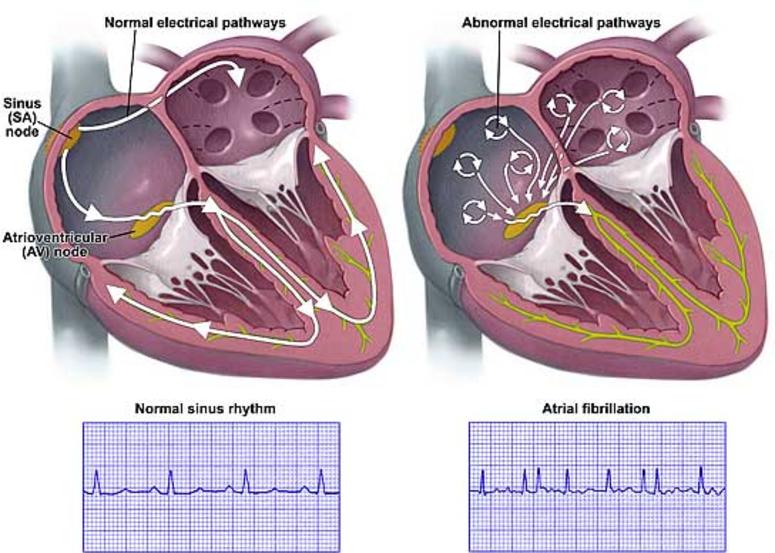What Is Atrial Fibrillation (AFib)?
Atrial Fibrillation or AFib, is a heart rhythm disorder (arrhythmia) that occurs in the top chambers of your heart – the atria. When in atrial fibrillation there is fast and chaotic electrical activity in the atria. In other words, instead of the atria having an organized rhythm and motion (normal sinus rhythm), the atria goes so fast that there is no meaningful contraction. Many impulses will reach the AV node and that will govern how fast the lower chambers – the ventricles, will contract, or how fast your heartbeat will be.

What Causes Atrial Fibrillation?
AFib may occur in patients with no heart disease or even patients with no medical problems at all. More commonly it is associated with cardiovascular diseases such as Hypertension, Coronary Artery Disease, or Congestive Heart Failure. There is also a strong link between Afib, obesity, and obstructive sleep apnea. Recent studies have shown that many patients have genetic traits that predispose them to atrial fibrillation.
The Most Common Causes and Risk Factors for AFib Include:
- Age – Older than 60 years of age
- Obesity – as the size of the body increases, the size of the heart and the stress on it increases, making the risk of AFib higher
- Obstructive sleep apnea – in patients with OSA, there are changes in the pressure inside the chest that can cause a stretch in the atria and an increased risk of AFib. CPAP and weight loss can help significantly
- Diabetes – it can cause many changes in the heart, including the risk of blockages and an increase in scar tissue formation
- Heart problems:
- High blood pressure
- Coronary artery disease
- Prior heart attacks
- Congestive heart failure
- Valvular heart disease (most commonly, mitral valve leakage)
- Prior open heart surgery
- Thyroid disease – some forms of AFib seen in patients with thyroid problems can be cured by treating the thyroid
- Chronic lung disease – patients with advanced lung disease are not only at higher risk of developing AFib but also have difficulty controlling AFib
- Excessive alcohol or stimulant use
- Serious illness or infection
- Pectus Excavatum
The Dangers of Atrial Fibrillation
AFib can lead to serious complications:
- Increased Stroke Risk: Blood clots formed in the heart may travel to the brain, leading to a stroke.
- Heart Failure: Long periods of untreated AFib can weaken the heart, causing heart failure.
- Severe Symptoms: AFib often causes heart palpitations, dizziness, fatigue, and shortness of breath.
Symptoms Associated With AFib
AFib can cause many symptoms, and while some patients are extremely symptomatic, others can’t even tell. The right treatment option for you will depend on how symptomatic you are.
Most patients start by having occasional spells, lasting minutes or a few hours. The disease then progresses to more frequent and long lasting spells. This progression varies from patient to patient. Lifestyle modification and treatment of other conditions that can cause or worsen AFib (such as hypertension, obesity, obstructive sleep apnea) may affect the progression.
Atrial fibrillation can feel like different things to different people. A few of the symptoms of Afib include:
- Racing, irregular heartbeat
- Fluttering in the chest
- Heart palpitations
- Dizziness
- Weakness
- Chest pain
- Shortness of breath
- Sweating
- Fatigue when exercising
- Faintness
Atrial Fibrillation and Congestive Heart Failure
Atrial fibrillation can decrease the heart’s pumping ability. The irregularity can make the heart work less efficiently. In addition, atrial fibrillation that occurs over a long period of time and that is not well treated can significantly weaken the heart and lead to heart failure.
Heart Failure is typically seen in patients who have had very fast heartbeats for long periods of time – many months. If diagnosed and treated quickly it can be reversible.
Types of Atrial Fibrillation
- Paroxysmal AFib: Short episodes that stop on their own.
- Persistent AFib: Episodes that require treatment to restore normal rhythm.
- Longstanding Persistent AFib: Continuous AFib lasting over a year.
- Permanent AFib: AFib that cannot be reversed, focusing on managing symptoms and preventing stroke.
Dr Jose Osorio
Miami, FL
Read More About AFib:




